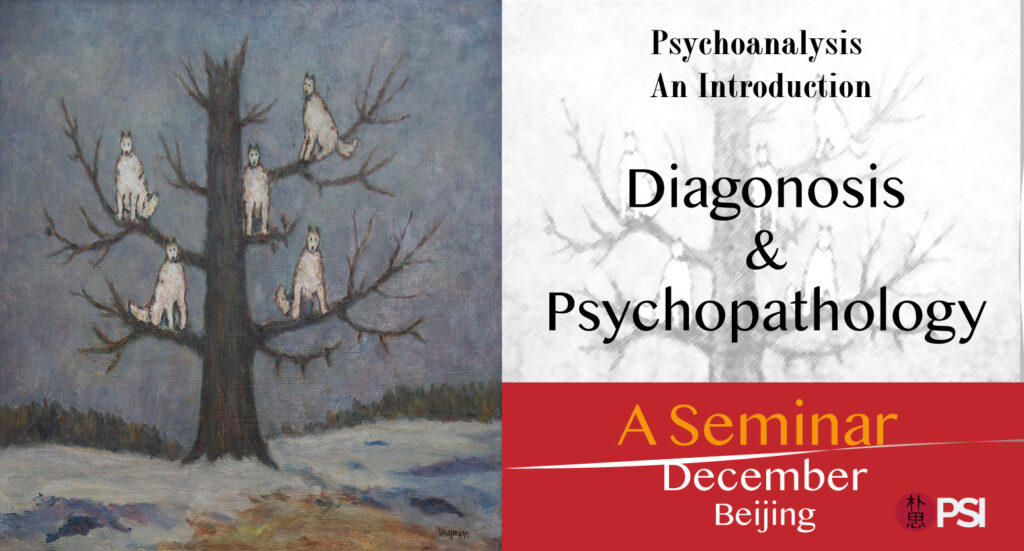A Workshop

This Seminar/Workshop is an introduction to psychopathology and diagnostics based on Freud’s case studies. The seminar consists of three sessions/lectures, group work and —separately— an optional Case Study workshop (see below under the rubric Assignments). In my experience with the local situation, questions such as the differences between a psychoanalytic diagnosis and contemporary psychiatric diagnosis, the role of diagnosis in treatment, and differential symptomatology can be considerably improved. Beyond psychotherapists and psychoanalysts, the course content serves as a general introduction to psychoanalytic theory and practice, suitable for a well-informed and interested public including working psychiatrists, students of clinical psychology or the humanities in general.
Although we provide certificates upon request, the main objective is to enhance the quality of care and offer an adequate introduction to psychoanalytic clinic that is often misrepresented.
The Seminar
This is the first part of a three-part series on diagnosis. The primary focus of this first part is neurosis and the second part will treat Phobia, bipolar, depression and anxiety. The third part will be about psychosis. The workshop comprises three sessions, each three hours long, followed by discussion groups and assignments. The content of the three workshops is detailed below:
- On Diagnostics and Psychoanalysis
What we use and do not use diagnostics for in psychoanalysis. What is the difference between a functionalist, a phenomenological, and a structural diagnostic model? DSM: its historical background and its clinical impact in Europe and North America. The description of different diagnoses in psychoanalysis. Their relation to child-related contemporary diagnostics: Autism (Asperger spectrum) and ADHD—what are they and how do we approach them from a psychoanalytical point of view?
- 2. Hysteria
Hysteria is not only a diagnostic term but also a structure and a historical starting point for Freud alongside the process of modernization. The psychoanalytic pathology finds its foundational terms in the encounter with hysteria. We will explore the range of symptoms, the fundamental components of its structure, historical shifts, and manifestations in the clinic. The material here includes both Freud’s texts and later developments in psychoanalytic literature.
- 3 Obsessional Neurosis and Borderline
Obsessional neurosis is the second major form of neurosis and a basis for a better understanding of certain clinical observations sometimes referred to as borderline. Under this rubric, we will study two of Freud’s major case studies and relate them to new literature. We will examine the difference between obsession and compulsion, as well as the clinical picture.
Time Schedule
Course start: Sunday December 1, 2 pm-5 pm
Seminar 2: Sunday December 8, 2 pm-5 pm
Seminar 3: Sunday December 22, 2 pm-5 pm
Literature, Assignments, Case Study Workshop
A preliminary literature list will be distributed 2 weeks before the starting date. Literature comprises Freud’s writings (mostly available both in English and Chinese), articles and excerpts from other authors, approximately 20 pages per session.
Group assignments will be announced during the first session. The work on assignments is conducted online and in small groups created during the first session.
The optional Case Study workshop is conducted in parallel. In the Case Study Group Workshop, a case will be proposed by participants or the workshop leader for discussion and guidance. The group is limited to five participants. The time for Case Study Workshop will be on Sundays at 5.30 pm and lasts for 1 hour and thirty minutes. More details will be announced during the first session of the seminar.
Location
This course is held both online and off-line. For participants from Beijing, it is imperative to participate in place.
This course is held in English.
Fees
Workshop fee: 1000 RMB. You are also welcome to join in for the first session, cost 300 RMB (in case of continuation the full amount will be added and charged). For Case Study Workshop, the fee is 400 RMB per session. The number of participants is limited to five persons.
Enrolment
Please Contact us via email at cabinet@doust-analysis.org. A selection will be made based on a very brief interview (10 minutes) on phone/Wechat. A Wechat list will be in a second step be established and is used for distribution of literature and other important announcements
